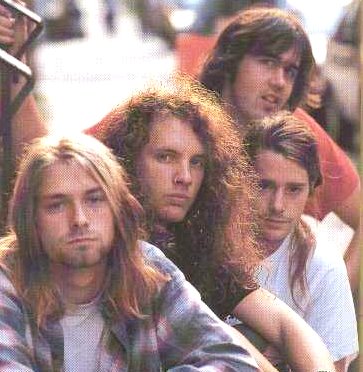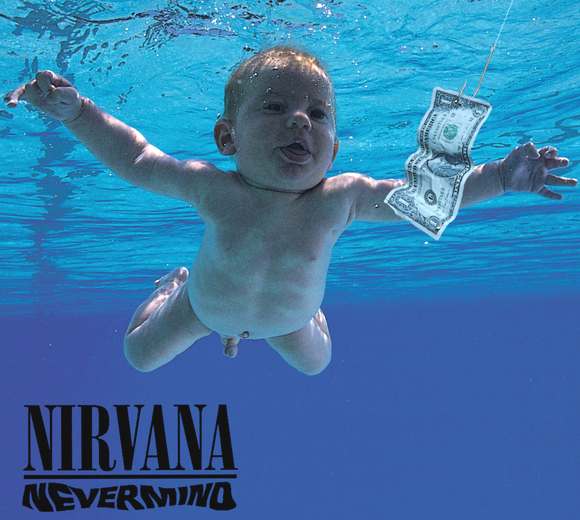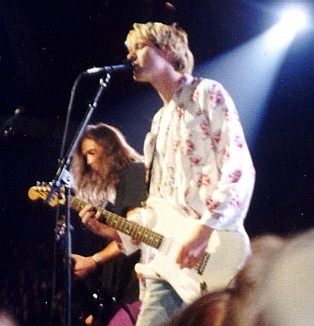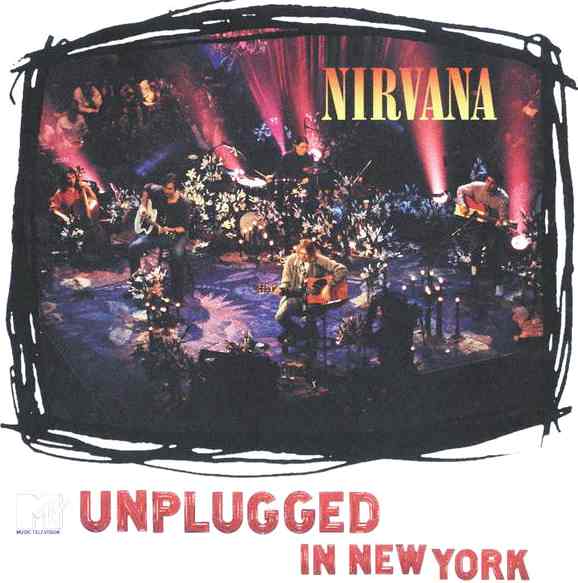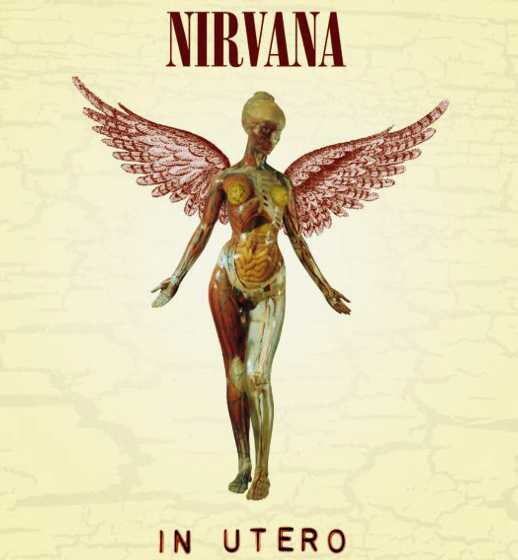|
NIRVANA
|
|||
|
HOME | BIOLOGY | FILMS | GEOGRAPHY | HISTORY | INDEX | INVESTORS | MUSIC | SOLAR BOATS | SPORT |
|||
|
Nirvana was an American rock band originating from Aberdeen, Washington. With the lead single "Smells Like Teen Spirit" from their 1991 album Nevermind, Nirvana exploded into the mainstream, bringing along with it a subgenre of alternative rock called "grunge". Other Seattle grunge bands such as Alice in Chains, Pearl Jam, and Soundgarden also gained in popularity, and, as a result, alternative rock became a dominant genre on radio and music television in the United States during the early-to-middle 1990s.
As Nirvana's frontman, Kurt Cobain found himself referred to in the media as the "spokesman of a generation", with Nirvana the "flagship band" of "Generation X". Cobain was uncomfortable with the attention and placed his focus on the band's music, challenging the band's audience with their third studio album In Utero. While Nirvana's mainstream popularity waned somewhat in the months following its release, their core audience cherished the band's dark interior, particularly after their 1993 performance on MTV Unplugged.
Nirvana in 1989 Front to back: Cobain, Everman, Channing, Novoselic
Nirvana's brief run ended with the death of Cobain in April of 1994, but the band's popularity expanded in the years that followed. Eight years after Cobain's death, "You Know You're Right", an unfinished demo that the band recorded two months prior to Cobain's death, topped radio playlists around the world. Since their debut, the band has sold more than sixty million albums worldwide (see also Best selling music artists), including more than ten million copies of Nevermind in the US alone. Nirvana remains a consistent presence on radio stations worldwide.
History
Early years
Cobain and Krist Novoselic met in 1985. Both were fans of The Melvins, and often hung out at the band's practice space. After a couple of false starts at forming their own band, the duo recruited drummer Aaron Burckhard, creating the first incarnation of what would eventually become Nirvana. Cobain later described the sound of the band when they first started as "a Gang of Four and Scratch Acid ripoff." Within a few months, Burckhard was fired from the band. He was temporarily replaced by Dale Crover of The Melvins, who played on the band's first demos. Dave Foster then began a brief tenure as the band's drummer.
During its initial months, the band went through a series of names, including Skid Row, Pen Cap Chew, and Ted Ed Fred. The band finally settled on Nirvana in early 1988, playing their first show under the name that March. A couple of months later, the band finally settled on a drummer, Chad Channing.
Nirvana's first official release was the single "Love Buzz/Big Cheese" in 1988. In 1989, the band released its first album, Bleach, on Sub Pop Records. The record had a limited first pressing of 1000 white vinyl records that were sold at the Lamefest in Seattle on August 8, 1989. Bleach was highly influenced by The Melvins, by the heavy dirge-rock of Mudhoney, and by the 70s rock of Black Sabbath and Led Zeppelin. Novoselic noted in a 2001 interview with Rolling Stone that the band had played a tape in their van while on tour that had an album by The Smithereens on one side and an album by the black metal band Celtic Frost on the other, and noted that the combination probably played an influence as well. Bleach became a favorite of college radio stations nationally, but gave few hints of where the band would find itself two years later.
The money for the recording sessions for Bleach, listed as $606.17 on the album sleeve, was supplied by Jason Everman. Everman was introduced to Cobain by Dylan Carlson, but had known Channing since the fifth grade. Everman began hanging out with the band, and offered to loan the money to them for the recording. Though Everman did not actually play on the album, he was credited for playing guitar on Bleach because, according to Novoselic, they "wanted to make him feel more at home in the band." After the album was completed, Everman had a brief and contentious stay with the band as a second guitar player, but was sacked following their first US tour. Not long after, he briefly played bass with Soundgarden before joining the band Mind Funk.
In early 1990, the band began working with producer Butch Vig on recordings for the follow-up to Bleach. During the sessions, Kurt and Krist realized that Chad was not the drummer the band needed, and he was let go after the sessions were complete. After a few weeks with Dale Crover of The Melvins filling in, they hired Mudhoney drummer Dan Peters, with whom they recorded the song "Sliver". Later that year, Buzz Osborne of The Melvins introduced them to Dave Grohl, who was looking for a new band following the sudden break-up of D.C. hardcore punks Scream.
Nevermind album cover - the baby pictured is Spencer Elden
Nevermind
Following repeated recommendations by Sonic Youth's Kim Gordon, David Geffen signed Nirvana to DGC Records in 1990. The band subsequently began recording its first major label album. The result, Nevermind, is now widely regarded as a classic.
For the album, the band decided to continue working with Vig. Rather than recording at Vig's Madison studio as they had in 1990, the band shifted to Sound City Studios in Los Angeles. For two months, the band worked through a variety of songs in their catalog. Some of the songs, including "In Bloom" and "Breed", had been in the band's repertoire for years, while others, including "On a Plain" and "Stay Away", lacked finished lyrics until mid-way through the recording process.
After the recording sessions were completed, Vig and the band set out to mix the album. However, after a few days, both Vig and the band realized that they were unhappy with how the mixes were turning out. As a result, they decided to call in someone else to oversee the mixing, with DGC supplying a list of possible options. The list contained several familiar names, including Scott Litt (known for his work with R.E.M.) and Ed Stasium (known for his work with The Smithereens). However, Cobain feared that bringing in known mixers would result in the album sounding like the work of those bands. He decided to choose the guy at the bottom of the list next to the name 'Slayer': Andy Wallace. (Wallace co-produced Slayer's 1990 album Seasons in the Abyss.)
Wallace brought to the album a completely different mindset, adding layers of reverb, drum sampling, and other studio trickery to give the album a glossy polish. A few months after the album's release, Cobain complained in the press that Wallace had made Nevermind sound too slick, even though Wallace had been his own choice and the band themselves had been involved in the mixing process. Even if the band was disappointed at the sound of the album, Wallace had successfully tempered the band's indie rock leanings and created a mainstream-ready rock sound that others would attempt to duplicate for the next decade.
Initially, DGC Records was hoping to sell 250,000 copies of Nevermind, which was the same level they had achieved with Sonic Youth's Goo. Instead, the album was certified triple-platinum (three million copies) in the US less than six months after its release. "Smells Like Teen Spirit" received heavy airplay on MTV, inspiring a slew of imitators and bringing the grunge sound into the mainstream. The popularity of alternative rock, as well as the sidelining of hair metal, is often credited to Nevermind. In January of 1992, the album reached the top of the Billboard album charts, replacing Michael Jackson's album Dangerous, an act often considered the defining symbol of the rise of alternative music over pop. Citing exhaustion, the band decided not to undertake another US tour in support of Nevermind, instead opting to make a handful of performances later that year.
In February 1992, following the band's Pacific Rim tour, Cobain married Courtney Love in Hawaii. Love gave birth to a daughter, Frances Bean, the following August. Just days after Frances Bean's birth, Nirvana performed one of its best-known concerts, headlining at the Reading Festival in England. Cobain entered the stage in a wheelchair as a practical joke, then proceeded to get up and join the rest of the band in tearing through an assortment of old and new material. At one point in the show, Cobain related to the crowd the recent birth of his daughter, and succeeded in having the crowd chant "Courtney, we love you!" in unison. Dave Grohl related in 2005 on the radio program Loveline [1] that the band was genuinely concerned beforehand that the show would be a complete disaster, given all that had happened in the months leading up to the show. Instead, the performance ended up being one of the most memorable of their career.
Cobain and Novoselic at the 1992 MTV Video Music Awards
Less than two weeks later, Nirvana put on a memorable performance at the MTV Video Music Awards. MTV had wanted the band to play "Smells Like Teen Spirit", but the band wanted to play a new song called "Rape Me". MTV was appalled at the idea of a song called "Rape Me", and eventually agreed that the band could play "Lithium" instead, the band's then-current single. When the band began their performance, Kurt strummed and sang the first few bars of "Rape Me", giving the MTV executives a solid shock before jumping into "Lithium". Near the end of the song, frustrated that his amp had stopped functioning, Novoselic decided to toss his bass into the air for dramatic effect. He misjudged the landing, and the bass ended up bouncing off of his forehead, forcing him to stumble off the stage in a daze. As Cobain trashed their equipment, Grohl ran to the mic and began yelling "Hi, Axl!" repeatedly, referring to Guns N' Roses singer Axl Rose, with whom the band and Courtney had had a bizarre encounter prior to the show.
Nirvana released Incesticide, a collection of rarities and B-sides, in December 1992. Many of Nirvana's BBC radio sessions and unreleased early recordings were starting to circulate via trading circles and illegal bootlegs, so the album served to beat the bootleggers to the punch. The album contained such fan favorites as "Sliver", "Dive", "Been a Son", and "Aneurysm" as well as covers of songs by The Vaselines, a band that became more popular as a result of Nirvana's covers.
In Utero
For 1993's In Utero, the band brought in producer Steve Albini, well-known for his work on the Pixies album Surfer Rosa. The sessions with Albini were productive and notably quick: the initial version of the album was recorded and mixed in two weeks, a far cry from the months spent recording and mixing Nevermind.
As Nevermind had brought in a new audience of listeners who had little or no experience with the alternative, obscure, or experimental bands Nirvana saw as their forebears, bringing in Albini appeared to be a deliberate move on Nirvana's part to give the album a raw, less-polished sound. For example, one song on In Utero featuring long periods of shrill feedback noise was titled, ironically, "Radio Friendly Unit Shifter". (In the industry, a "radio-friendly unit shifter" describes an "ideal" album: one capable of heavy radio play and ultimately selling many copies, or "units".) However, Cobain insisted that Albini's sound was simply the one he had always wanted Nirvana to have: a "natural" recording without layers and layers of studio trickery.
Prior to the album's release, controversy erupted. Stories ran in several magazines suggesting that DGC was unhappy with the completed album and that it might be shelved. As a result, fans began to believe that the band's creative vision might be compromised by their label. While the stories about DGC shelving the album were untrue, the band was actually unhappy with certain aspects of Albini's mixes. Specifically, they thought the bass levels were too low, and Cobain felt that "Heart-Shaped Box" and "All Apologies" didn't sound "perfect". Longtime R.E.M. producer Scott Litt was called in to help remix those two songs, with Cobain adding additional instrumentation and backing vocals. Litt also remixed "Pennyroyal Tea," but Albini's version was used on the album. (DGC later planned to release Litt's remix as a single.)
With the release of In Utero, the band also faced corporate censorship. Giant store chains Kmart and Wal-Mart refused to carry the album, citing song titles like "Rape Me" and Kurt's plastic-fetus collage on the back cover as too controversial for the "family-oriented" retailers. The band decided to abide by the request, and compiled a version of the album with "clean" artwork and "Rape Me" retitled "Waif Me". Other than the inclusion of Litt's mix of "Pennyroyal Tea", however, the music on the album was identical to the wider release. When asked about the edited version, Kurt noted that he could relate to the small-town residents that had no other local music stores and were forced to buy their music at Kmart.
While "Heart-Shaped Box" was received warmly by alternative and mainstream radio, and In Utero debuted at number one on the Billboard Album chart, the album did not enjoy the same success as Nevermind. That fall, Nirvana embarked on a US tour, its first major tour of the States since the success of "Smells Like Teen Spirit". (For touring in support of In Utero, the band added Pat Smear of the punk rock band The Germs as a second guitarist.)
In November 1993, the band decided to change direction and sat down for an appearance on MTV Unplugged. The sessions revealed the depth of Cobain's songwriting, which had often been buried under the sonic fury of the band's sound. The song selection also demonstrated Cobain's broad musical interests through his choice of cover songs. It became a hallmark moment of Nirvana's history, if not amplified by the tragedy soon to follow.
In early 1994, the band embarked on a European tour. While the tour started off well, the performances gradually declined, with Kurt looking bored and distracted during the shows, particularly during the Italian leg of the tour. Following a tour stop at Terminal Eins in Munich, Germany, on March 1, Cobain was diagnosed with bronchitis and severe laryngitis. The next night's show at the same venue was cancelled. On the morning of March 4, Love found Cobain unconscious and he was rushed to the hospital. The doctor told a press conference that the singer had reacted to a combination of prescription Rohypnol and alcohol. The rest of the tour was canceled, including a planned leg in the UK.
In the ensuing weeks, Cobain's heroin addiction resurfaced. An intervention was organized, and Cobain was convinced to check into drug rehabilitation. After less than a week in rehabilitation, Cobain climbed over the wall of the facility and took a plane back to Seattle. A week later, on Friday, April 8, 1994, Cobain was found dead by an electrician at his Seattle home, effectively dissolving Nirvana.
MTV Unplugged in New York album cover
After Cobain's death
Several Nirvana albums have been released since Cobain's death. The first came in November of 1994 with the release of the band's performance for MTV Unplugged, MTV Unplugged in New York. This album included guest appearances by members of the Meat Puppets, as well as cover versions of songs by the Meat Puppets, Lead Belly, The Vaselines, and David Bowie.
Two weeks after the release of Unplugged in New York, a video compilation of Nirvana performances, titled Live! Tonight! Sold Out!!, was released. Cobain himself had compiled a significant part of the video, which documented much of the Nevermind tour. Memorable footage from the video included an infamous incident with a bouncer at a Texas club in October 1991, as well as the band's performance of "Aneurysm" donned in dresses at the Hollywood Rock Festival in Rio de Janeiro, Brazil in January 1993.
The original intention was to release the MTV Unplugged set in a double-disc package, along with a second disc of live electric material to balance the acoustic set. However, for the two surviving band members, sorting through the treasure trove of Nirvana recordings so soon after Cobain's passing became too emotionally overwhelming. The live disc, a compilation of Nirvana concert recordings, finally saw release in October of 1996, titled From the Muddy Banks of the Wishkah.
In August of 1997, online music news website Wall of Sound reported that Grohl and Novoselic were organizing a box set of Nirvana rarities. Four years later, the band's label announced that the box set was complete and would see release in September to coincide with the 10th anniversary of the release of Nevermind. However, shortly before the release date, Love filed an injunction to stop the box set's release and sued Grohl and Novoselic, claiming that Cobain's former bandmates were hijacking Nirvana's legacy for their own personal interests. What followed was a protracted legal battle over the ownership of Nirvana's music that lasted for more than a year.
Much of the legal wrangling centered on a single unreleased song, "You Know You're Right", the band's final studio recording. Grohl and Novoselic wanted to include the song on the box set, essentially releasing all of the rarities at one time. Love, however, argued that the song was more important than just a generic "rarity", and should be included on a single-disc greatest hits compilation. After more than a year of often public and sometimes bizarre legal maneuvering, the parties settled, agreeing on the immediate release of the greatest hits package including "You Know You're Right", titled simply Nirvana. In turn, Love agreed to donate cassette demos recorded by Cobain for use on the box set.
Nirvana fans' first taste of "You Know You're Right" came in early 1995 when Love played a version of the song with her band Hole on MTV Unplugged under the title "You've Got No Right". A live rough draft version of the song performed by Nirvana at their October 23, 1993 concert at the Aragon Ballroom in Chicago surfaced in Nirvana tape-trading circles a few months later. In the years that followed, rumors of the existence of a studio version of the song perpetuated through Nirvana's fanbase and grew to almost mythic proportions. For fans, the first real confirmation of the studio version's existence came in November 2001 when Access Hollywood aired a ten second clip of the song as part of an interview with Love. In May 2002, several longer clips surfaced on the Internet via an unknown source, who claimed he was planning to release the entire song. However, the source backed down, fearing legal action. As the court case neared completion in September 2002, the entire song unexpectedly leaked, days before the announcement of the release of Nirvana. Even though the studio version turned out itself to be a rough draft with unfinished lyrics, fans and non-fans alike adored the song, leading it to become one of the most-played songs on alternative radio in both 2002 and 2003.
Nirvana was released on October 29, 2002. On top of "You Know You're Right", the album contained hit singles from their three studio albums as well as several alternate mixes and recordings of familiar Nirvana songs. Following its release, many long-time fans complained about the song selection, noting that the alternate version of "Been a Son" (from the Blew EP) was not the band's preferred version, and that the disc lacked songs such as "Sappy" (released as "Verse Chorus Verse") that had received significant radio airplay in the US following Cobain's death. Fans outside the US questioned the inclusion of the Unplugged version of "All Apologies" (as opposed to the single version from In Utero) and the Bleach version of "About a Girl" (where the Unplugged version was a popular single in 1994). Also, with a running time of under fifty minutes, there was certainly ample space to include other popular songs, such as "Love Buzz", "Drain You", "Aneurysm", and "Where Did You Sleep Last Night?" (the latter of which was included on some foreign releases of the disc).
The box set, With the Lights Out, was finally released in November 2004. The release contained a vast array of early Cobain demos, rough rehearsal recordings, and live tracks recorded throughout the band's history. Of note to serious Nirvana fans were unfinished studio recordings of "Old Age" and "Verse Chorus Verse" (different from "Sappy") recorded during the Nevermind sessions. Another notable track on the box set was a solo acoustic demo of a song called "Do Re Mi", recorded by Cobain in his bedroom. The song showed that even in the turmoil of his final days, Kurt still had the gift for melody that he had demonstrated so many years earlier in songs like "About a Girl".
A best-of-the-box compilation titled Sliver: The Best of the Box was released in the fall of 2005. The CD compiled nineteen tracks from the box set plus three previously unreleased tracks, including a version of the song "Spank Thru" from the fabled 1985 Fecal Matter demo tape. According to Rolling Stone, Cobain's daughter Frances Bean aided in the selection of the title and cover art.
In a 2002 interview with Jim DeRogatis, Love described the countless rehearsal tapes, demos, and bedroom recordings that were left behind after Cobain's death. For example, a four-track version of "Do Re Mi" was apparently recorded with Kurt on drums, Pat Smear on guitar, and Eric Erlandson on bass. Whether anything from the remaining archive will ever see release remains to be seen.
In Utero album cover
Post-Nirvana
In the years following Nirvana's disbanding, both of its surviving members have remained musically active. Not long after Cobain's death, Grohl recorded a series of demos which eventually became the debut album for the Foo Fighters. As of 2006, the Foo Fighters have released five commercially successful albums. The Foo Fighters' 2005 album In Your Honor features a song called "Friend of a Friend", which Grohl wrote in 1990 about his first encounters with Cobain and Novoselic.
Beyond the Foo Fighters, Grohl has also drummed for bands including Tom Petty and the Heartbreakers, Mike Watt, Queens of the Stone Age, Tenacious D, Nine Inch Nails, Garbage, Killing Joke, and Cat Power. He also recorded an album of metal songs featuring many of his favorite early-80s metal singers under the name Probot.
After the end of Nirvana, Novoselic formed Sweet 75. More recently, he founded Eyes Adrift with Curt Kirkwood (formerly of the Meat Puppets) and Bud Gaugh (formerly of Sublime). He also performed in a one-off band called the No WTO Combo with Kim Thayil of Soundgarden and Jello Biafra of the Dead Kennedys that coincided with the WTO Meeting of 1999. Novoselic's other credits include playing bass on a song performed by Johnny Cash for the 1996 Willie Nelson tribute album "Twisted Willie", as well as playing farfisa organ on "Against the 70s" for Mike Watt's 1995 album Ball-Hog or Tugboat?.
Novoselic also became a political activist, founding the political action committee JAMPAC to push musicians' rights. In 2004, he released a book titled Of Grunge and Government: Let's Fix This Broken Democracy, which covered his musical past as well as his political endeavors. During the 2004 Presidential campaign, Grohl and Novoselic appeared on stage together in support of the John Kerry campaign.
While Nirvana came to a sudden conclusion following their final show in Munich, the remaining members of the band (including Pat Smear) offered a bittersweet farewell to the band's fans. At the end of the Foo Fighters' 1997 performance at the Bumbershoot festival in Seattle, Grohl suddenly jumped behind the drum kit, with Novoselic wandering onstage with bass guitar in hand. The trio (Grohl, Novoselic, and Smear) serenaded the enthusiastic crowd with loose covers of Prince's "Purple Rain" and Led Zeppelin's "Communication Breakdown". The short performance served as a lighthearted (and loud) nod to Seattle and all who supported Nirvana during its short, tumultuous, and unforgettable run.
Courtney Love and licensing
On April 13, 2006, Love announced that she had arranged to sell twenty-five percent of her stake in the Nirvana song catalog in a deal estimated at $50 million. The purchaser was Larry Mestel, a former CEO of Virgin Records and current head of Primary Wave Music Publishing. As Love controlled ninety-seven percent of Nirvana's catalog, the deal means that Mestel has a significantly larger stake than Novoselic and Grohl combined.
To preemptively squelch backlash from fans worried about the overcommercialization of a decidedly anticorporate band, Love sought to assure Nirvana's fanbase that the music would not simply be licensed to the highest bidder. In her released statement, Love wrote, "We are going to remain very tasteful and true to the spirit of Nirvana while taking the music to places it has never been before."
Band members
Prior members
Touring members
LINKS and REFERENCES
New energy drinks for adventure capitalists
Solar Red | Solar Crush | Solar Cola | Solar Citrus | Solar Spice
|
|||
|
This
website
is Copyright © 1999 & 2007 NJK. The bird |
|||
|
AUTOMOTIVE | BLUEBIRD | ELECTRIC CARS | ELECTRIC CYCLES | SOLAR CARS |
